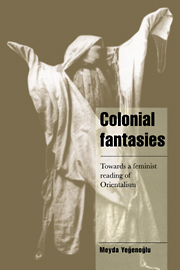Book contents
- Frontmatter
- Contents
- Acknowledgment
- Introduction
- 1 Mapping the field of colonial discourse
- 2 Veiled fantasies: cultural and sexual difference in the discourse of Orientalism
- 3 Supplementing the Orientalist lack: European ladies in the harem
- 4 Sartorial fabric-actions: The Enlightenment and Western feminism
- 5 The battle of the veil: woman between Orientalism and nationalism
- Notes
- Bibliography
- Index
3 - Supplementing the Orientalist lack: European ladies in the harem
Published online by Cambridge University Press: 22 October 2009
- Frontmatter
- Contents
- Acknowledgment
- Introduction
- 1 Mapping the field of colonial discourse
- 2 Veiled fantasies: cultural and sexual difference in the discourse of Orientalism
- 3 Supplementing the Orientalist lack: European ladies in the harem
- 4 Sartorial fabric-actions: The Enlightenment and Western feminism
- 5 The battle of the veil: woman between Orientalism and nationalism
- Notes
- Bibliography
- Index
Summary
The citationary nature of Orientalism
Since its publication Said's Orientalism has been subjected to critical evaluation, at times appreciative and at other times quite disingenuous. Strikingly, attention to Orientalism's entanglement with issues of gender has been missing in such critical assessments. In recent years we have witnessed the publication of numerous books that attempt to fill this lacuna by examining the missing link between Orientalism and Western women's discourse. In addition, studies that highlight the masculine nature of categories of Orientalist discourse have also proliferated. As Said himself also recognizes in Culture and Imperialism, studies about the Middle East have been dominated by masculism, and he acknowledges the important role feminist works play in undermining this hegemonic attitude by demonstrating the “diversity and complexity of experience that works beneath the totalizing discourses of Orientalism and of Middle East (overwhelmingly male) nationalism.”
It is hard to disagree with Said's recognition of the importance of such feminist works. However, it is also interesting to observe that Said does not engage these feminist arguments in his own work. Can we regard these works as unequivocally “corrective” of the problems of Orientalism, just for the sake of conceding feminism? What would the implications of such an easy embracing for feminist politics? I think, accepting the importance of such feminist works should not leave us blind to the controversial propositions advanced in some of these projects simply because they interrogate Orientalism's totalizing gesture by demonstrating the (feminine) diversity beneath the discourse of Orientalism.
- Type
- Chapter
- Information
- Colonial FantasiesTowards a Feminist Reading of Orientalism, pp. 68 - 94Publisher: Cambridge University PressPrint publication year: 1998
- 1
- Cited by

